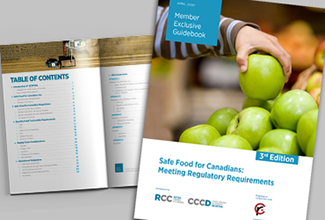New Requirements for All Retailers
RCC was successful in having enforcement activities around new requirements for the Safe Food for Canadians Regulations (SFCR) postponed to allow food retailers to focus on COVID-19. Postponed requirements include:
- All new requirements that were slated to take effect on July 15, 2020 for manufactured foods, including licencing, preventive control plans, record keeping and reporting have been postponed indefinitely.
- Fresh Fruit and Vegetable lot codes compliance deadline was postponed to January 15, 2021 from January 15, 2020. CFIA posted update guidance here.
- Implementation of the requirement to upload a copy of the organic certificate for imported organic products has been postponed to January 2022.
On January 15, 2019, the Safe Food for Canadians Regulation (SFCR) became law. This new law strengthened existing food regulation, implementing many new requirements for selling food and safeguarding food that’s imported and exported. While many of the rules apply to those who prepare food, ALL retailers who sell foods of any type must now meet certain requirements.
To help Retail Council of Canada members manage new compliance requirements, the association has updated its member exclusive Safe Food for Canadians: Meeting Regulatory Requirements guidebook. This 3rd edition addresses requirements for all retailers selling any type of food and offers suggestions and resources concerning ways to comply with these updated regulations.

SFCR Guidebook
RCC has updated its member exclusive Safe Food for Canadians guidebook to help its members manage new compliance requirements.

Free Assessment Tool
RCC has developed a free assessment tool to help retailers find out if the new legislation applies to them.
Frequently Asked Questions
What do I need to know about these regulations?
If you sell any type of food, even if in small quantities, then you must take action to comply with these regulations. Food is defined as any product manufactured, sold, or represented for use as food or drink. It includes any type of beverages, candy, gum, snacks, etc.
What are the key compliance fundamentals?
- Companies must keep records that trace food one step forward and one step back.
- Products must be labelled to meet the Safe Food for Canadians Regulations.
- Products should be stored and maintained in good condition to ensure the continued safety of products.
- Retailers who send food products across Provincial or Territorial boundaries must ensure they source products that are prepared by Safe Food for Canadians Licence holders.
- Retailers that directly import food are required to hold their own license.
When do I need to comply by?
RCC was successful in having enforcement activities around new requirements for the Safe Food for Canadians Regulations (SFCR) postponed indefinitely.
This applies to all new requirements that were slated to take effect on July 15, 2020 for manufactured foods including licencing, preventative control plans, record keeping and reporting.
RCC will advise on details for when these new regulations will start being enforced. Any questions from retailers on Safe Food for Canadians legislation can be forwarded to Jason McLinton, VP Grocery Division and Regulatory Affairs, jmclinton@retailcouncil.org.
Where can I get help?
RCC is available to help. Offered resources include: Member Exclusive Safe Food for Canadians Regulations Guidebook, Member-Exclusive Webinars, one-on-one Q&A discussions and for a fee, access to consulting help to develop compliance plans.
Not a member and want access to this guidebook and others? Contact us here, at membership@retailcouncil.org or call 1-888-0373-8245.
If you have any questions concerning the updated Safe Food for Canadians Regulations, please contact Jason McLinton, Vice President, Grocery Division and Regulatory Affairs at jmclinton@retailcouncil.org
